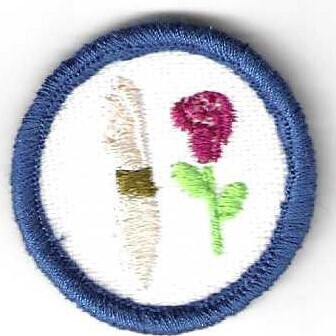Categories
Magnificent Manners, Va Skyline Council own IP (Remake)
$3.00
Sold out
Sold out
Customer reviews
Reviews only from verified customers
No reviews yet. You can buy this product and be the first to leave a review.
Product Details
Requirements
Activities #1, #3, #5, #8, #9, #10 and #13 are required.
Do three others to complete Interest Project.
*1. Etiquette is a French word that means ticket. In the days of French kings,
people were only given a ticket to visit the palace if they knew how to act
properly, knew the rules of social behavior, and could speak properly. In other
words, etiquette means knowing how to act with other people. Discuss or invite
someone to your meeting to discuss etiquette: what it means and where it fits
into today’s society. Look at a book on etiquette, see what is recommended for
the different situations and/or activities within this Interest Project.
2. Learn the rules of introductions. Practice making introductions under several circumstances including
friends to friends, friends to adults, boys to girls, adults to adults, and introducing a speaker to a group such
as your troop or class at school.
*3. Find out the proper way to write letters, thank you notes, invitations and RSVPs. RSVP is short for the
French phrase “Repondéz s’il vous plait” (ray-pon-DAY see voo play) and it means please respond. Find out
when it is okay to accept an invitation by phone and when a written reply is necessary. Learn the parts of a
letter and their proper placement and how to address envelopes. Know how to select appropriate stationery
for your letter. A trip to a stationery store or printers might be helpful and interesting. Practice by writing one or
more of the following letters in proper form on appropriate stationery:
* A thank you note for a birthday gift, a weekend visit, a graduation gift or to someone who has spoken at your
troop meeting.
* A letter to a friend who is sick or to a friend who moved away last year.
* A response accepting a wedding invitation.
* A response declining an invitation to a friend’s party.
4. Make up a list of good telephone manners including making calls, receiving calls, taking messages from
phone calls and from an answering machine and general phone manners. Role play telephone conversations
or situations to demonstrate right and wrong ways to use the phone.
*5. Make a chart outlining the responsibilities of a good hostess. Make a chart showing the responsibilities of
a good guest.
6. Discuss conversation starters, tactful conversation and conversation do’s and don’ts. Learn how to mingle,
how to meet people at a party or reception and how to make a new person in a group feel at ease. Know
when it is proper to use first names. Discuss good manners involving people with disabilities (for example, not
to over react to a person with a disability, when to ask if you can give them assistance, etc.). Discuss how you
can treat them with the same respect as everyone else. Practice all these skills using role playing.
7. Discuss how to select gifts for family, for friends, for a thank you or hostess gift and for someone you don’t
know (for example, a family from an “Angel Tree” at Christmas). Know when it is appropriate to give money
and when it is not. Make a list of gifts that you should never give.
*8. Find out about china, crystal and silver. Learn the names of the most common pieces and a few not so
common. Learn where to place these pieces. Make up some menus and demonstrate by drawing or by using
actual dinnerware the proper setting for a family dinner, a formal dinner and a buffet. Make a list of ideas for
centerpieces and learn candle etiquette. Find out about table linens and learn some new ways to fold napkins.
Know the four types of meal service and rules for serving foods.
*9. Discuss good table manners, include the following: sitting at the table, when to begin eating, proper use of
flatware, dishes and glassware, eating special or hard to handle foods, mealtime conversation, saying a
blessing or grace, excusing yourself from the table when you have finished, what to do if you do not like one
of the foods that is served, when it is appropriate to eat with your fingers and other table do’s and don’ts.
*10. Discuss dining out, include the following: entering and seating, waiters and waitresses, ordering and
menus, ordering drinks, conversation, where and when to pay the check or bill, going Dutch, tipping and
leaving. Know the following terms: à la carte, table d’hote, virgin or nada drink. Know how to select foods at a
buffet or reception.
11. Discuss manners in public places, include the following: dressing appropriately for the occasion,
grooming, posture, gum, how to handle hiccups, coughing and sneezing and movie and hotel etiquette.
12. Find out about careers as a professional hostess.
*13. To use your new skills, plan a trip to a nice restaurant for a meal with your troop.
OR
Using your new skills, with your troop plan and give a dinner party or reception for mothers and/or fathers,
another troop, or other group. This can include selecting a theme, writing invitations, planning the menu,
decorations, seating, entertainment, preparing the food and being the hostess for the occasion.
Developed by:
Girl Scouts of Virginia Skyline Council
Senior Troop #279
Lynchburg, Virginia
Rebecca Eubank, Leader
Save this product for later
Magnificent Manners, Va Skyline Council own IP (Remake)
Powered by Lightspeed
Display prices in:USD
